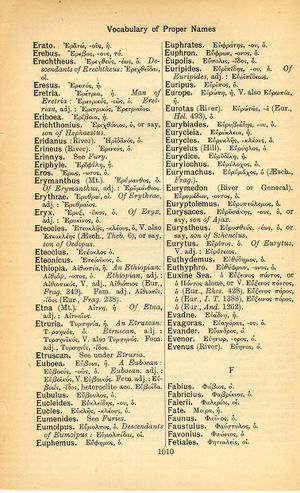Eupolis: Difference between revisions
Περὶ τοῦ ἐπέκεινα τοῦ νοῦ κατὰ μὲν νόησιν πολλὰ λέγεται, θεωρεῖται δὲ ἀνοησίᾳ κρείττονι νοήσεως → On the subject of that which is beyond intellect, many statements are made on the basis of intellection, but it may be immediately cognised only by means of a non-intellection superior to intellection
m (Text replacement - "}}]]" to "}}]]") |
m (Text replacement - "link={{" to "link={{") |
||
| Line 1: | Line 1: | ||
{{WoodhouseENELnames | {{WoodhouseENELnames | ||
|Text=[[File:woodhouse_1010.jpg|thumb | |Text=[[File:woodhouse_1010.jpg|thumb | ||
|link= | |link={{filepath:woodhouse_1010.jpg}}]]Εὔπολις, -ιδος, ὁ. | ||
}} | }} | ||
{{Lewis | {{Lewis | ||
Revision as of 10:10, 15 August 2017
English > Greek (Woodhouse)
Εὔπολις, -ιδος, ὁ.
Latin > English (Lewis & Short)
Eupŏlis: ĭdis, m., = Εὔπολις,
I a celebrated comic poet in Athens, contemporary with Aristophanes, Hor. S. 1, 4, 1; Vell. 1, 16; Quint. 1, 10, 18; 10, 1, 66; 12, 10, 65 al.; acc. Eupolin, Hor. S. 2, 3, 12: Eupolidem, Pers. 1, 124; Cic. Brut. 9, 15.
Latin > French (Gaffiot 2016)
Eupŏlis,¹⁴ ĭdis, m. (Εὔπολις), poète grec de l’ancienne comédie : Cic. Br. 38 ; Hor. S. 1, 4, 1. acc. -in Hor. S. 2, 3, 12 ; -idem Pers. 1, 124.
Latin > German (Georges)
Eupolis, polidis, Akk. polin, selten polidem, Abl. polī u. polide, m. (Εὔπολις), ein alter griech. Komödiendichter zu Athen, Zeitgenosse des Aristophanes, Cic. Brut. 38. Cic. ad Att. 12, 6, 3 (Abl. Eupoli). Hor. sat. 1, 4, 1; 2, 3, 12 (Akk. Eupolin). Vell. 1, 16, 4. Quint. 10, 1, 66. Pers. 1, 124 (Akk. Eupolidem).

